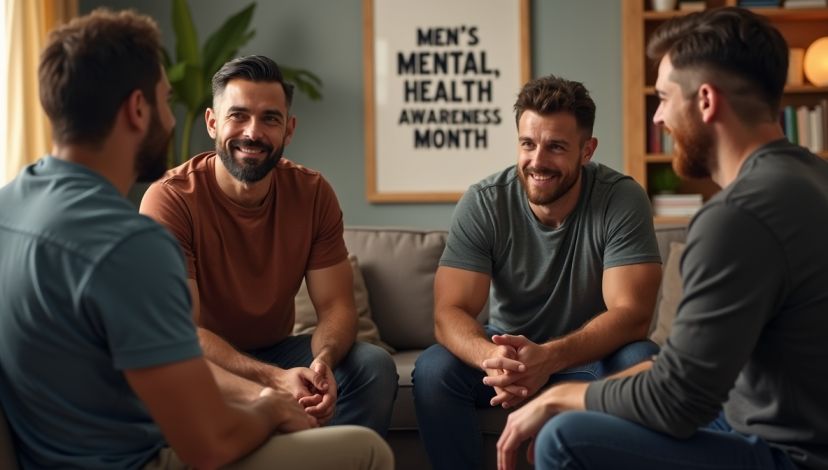Men’s Mental Health Awareness Month is an important time dedicated to shining a light on the mental health challenges that men face. Although a lot has been done in terms of the general awareness on mental health, men continue to face challenges that have been hindering them to get help. Men are creatures of society, and preset societal expectations usually push them to a point where they are expected to be strong and unemotional; therefore, relating to silence and untreated mental health problems. The aim of this month is about talking openly, teaching, and supporting men in order to live a healthier and happier life.
Key Points:
- Comprehensively, men hardly ever seek any assistance even to mental health issues compared with women.
- Men are greatly outnumbered in rate of committing suicide than women.
- The sharing of emotions and de-stigmatization are life-saving practices.
Why Is Men’s Mental Health Awareness Month Important?
Men’s Mental Health Awareness Month highlights the fact that mental health problems affect men just as much as women, but men often face greater stigma. Conventional concepts of masculinity do not allow men to be vulnerable and to seek assistance. As an illustration, one only believes that such statements as man up or boys do not cry teach bad stereotypes that makes men lonely at the emotional level. The problem that needs to be rectified this month is to create awareness and acceptance.
The latter aspect is more likely to lead to instances of men being depressed, anxious, and exhibiting substance abuse tendencies rather than raising their voices on the matter. The problem of suicide also kills many men, and the rates of male suicide death are approximately four times higher than the rates of female death in most countries. This month creates awareness because it makes men look for the indications of distress in themselves and in other people and consult professionals in case they are necessary.
An illustrative example is the research conducted in the UK, which reveals that 40% of men have never discussed their mental health; therefore, silence is the crucial impediment. Raising awareness aims at promoting healthy and standardizing the discussion of emotions and mental health treatment, which will allow men to come forward more quickly.
What are The Larger Mental Health Issues Affecting Men?
There are various psychological/mental-related issues that men are associated with and which can be largely connected with the societal pressures and concerns in life. These include:
- Depression and Anxiety: Men can exhibit the symptoms in a different way sometimes, they will not demonstrate sadness but may be irritable or angry, which will be erroneously regarded as a sign of anger.
- Substance Abuse: Men have higher chances of abusing alcohol and using drugs to deal with emotional distress or stress.
- Suicide Risk: Men contribute to suicide risk, as it can be frequently determined by untreated mental disorders and inability to take care of themselves.
- Work and Financial Pressure: It is a serious pressure to lead, especially the pressure to become the main earner.
- Relationship and Emotional Isolation: Men find it hard to build emotional bonding or share their emotions with others, thereby contributing to loneliness.
| Mental Health Challenge | Common Signs in Men | Impact |
| Depression | Irritability, anger, withdrawal | Reduced work performance, risk of suicide |
| Anxiety | Restlessness, tension, avoidance | Social isolation, panic attacks |
| Substance Abuse | Increased use of alcohol/drugs | Health decline, addiction |
| Suicide | Hopelessness, risk-taking behavior | Leading cause of death in men |
Recognizing these issues is the key to customizing assistance and interventions that react to the particular needs of men.
What Can the Society do to Take Care of Men?
Men’s mental health should be supported through the cooperation of family members, workplaces, medical workers, and society. These are some of the solutions that you can offer:
- Open Up Discussions: Promote the relevance of safe spaces through which men can express their hearts without hesitation or fear.
- Advance Mental Health Education: Spreading awareness about symptoms and available methods of treatment will eliminate the stigma, as well as misunderstanding.
- Expand Service Delivery: Providing male-friendly services such as teletherapy, peer community networks, and the use of mental healthcare professionals.
- Workplace Wellness Programs: Workers can be advised, given stress management meetings, and the employer can have a flexible work policy.
- Confront Unhealthy Stereotypes: Through education and national campaigns, people can reverse the nature of masculinity and emotions.
Case in point: Mental health days and confidential counseling are one of the systems applied by some companies, which have assisted in facilitating men to seek such assistance without the prospect of being stigmatized. Men’s circles are also established within community groups, inspiring sharing experiences among men and healing through connections.
| Support Method | Benefits | Example |
| Open Conversations | Reduces stigma, builds trust | Men’s support groups |
| Education | Increases awareness | Public mental health campaigns |
| Access to Services | Early intervention, treatment | Teletherapy platforms |
| Workplace Programs | Reduces work-related stress | Employee assistance programs |
| Challenging Stereotypes | A cultural shift in masculinity | Social media awareness drives |
How Does Early Intervention Contribute to the Mental Health of Men?
Prevention of deteriorating mental health is essential, and therefore, early intervention measures play a very important role. The male gender tends to wait until there is a crisis case, through trying suicide or substance addiction. This is possible when earlier symptoms, including modifications in mood, sleeping difficulties, or loss of interest in escaping the social sphere, are identified and assistance can be provided in time.
The issues can be diagnosed at an early stage through mental health screening as part of scheduled medical care. As an example, primary care physicians may inquire about the level of mood and stress in men and refer them to mental health professionals in case of necessity. Coping skills can be taught through early therapy or counseling and avoid permanently damaging the individual.
Case in point: A male who encounters continuous fatigue and irritability may not take these symptoms seriously at once. But once he is made to talk about such symptoms at a health checkup, then he will be assisted before depression builds up. Treatment early in life results in better adaptation and healthiness.
What are the daily ways for men to maintain their mental health?
There are feasible habits that men can follow daily to ensure that they are mentally healthy. These include:
- Regular Physical Exercise: Exercise elevates endorphins and lightens the mood, and decreases stress.
- Proper Sleeping Habit: Good sleeping help to regulate all feelings, and it is cognitive.
- Balanced Diet: There is an effect of nutrition on the health and energy of the brain.
- Mindfulness and Relaxation: Anxiety is dealt with by the practice of mindfulness approaches, which could comprise meditation or deep breathing.
- Social Connections: Friendship and family connection helps in countering the feeling of loneliness.
- Enlisting Some Help: Self-awareness to realize when they need some professional help, and then taking action.
Case study: John is a male, aged 35. He began to jog every day and meditate. He found that he is less anxious and sleeping better. When his work stress started to grow, he enrolled in a men’s mental health group, which allowed him not to hide his feelings and become isolated.
| Daily Habit | Mental Health Benefit | Practical Tip |
| Physical Activity | Boosts mood, reduces stress | 30 minutes walk or jog daily |
| Sleep Hygiene | Improves emotional stability | Maintain a consistent bedtime |
| Balanced Diet | Supports brain function | Eat fruits, vegetables, and whole grains |
| Mindfulness | Reduces anxiety | Use apps or guided meditation |
| Social Connections | Prevents loneliness | Schedule regular meetups |
| Seek Help | Early treatment | Talk to a counselor or doctor |
Note: Physical health is not the only thing that should be taken good care of, as much as mental health should be taken.
Note: By promoting open discussions among men and also letting them express their emotions, numerous lives will be saved.
Conclusion
Men’s Mental Health Awareness Month is a vital reminder that mental health challenges affect men deeply but are often hidden behind stigma and silence. Supporting knowledge, freedom of speech, intervention, and educational environments will help men escape negative perceptions and go to places that can help them. Mental wellness is not a weakness but a component of general well-being, which should be taken care of. United, we shall make a culture wherein men not only survive, but prosper emotionally and physically.
FAQ’s
1. When is Men’s Mental Health Awareness Month observed?
It is celebrated once a year in November with the aim of highlighting the mental health problem of men and promoting it through solidification.
2. What prevents men from asking for help in case of mental health issues?
Masculinity is expected and stigmatized in such a way where men are encouraged not to express feelings of vulnerability or to seek help.
3. Which are some of the common mental health in men?
Some of the popular issues that affect men are depression, anxiety, drug abuse, and suicides.
4. What can workplaces do to help men out mentally?
Through the provision of counseling services, mental health information, stress management programmes, and by encouraging open communication.
5. What can men actually do to take better care of their mental health whenever they feel currently unwell?
Get some exercise, rest, and sleep well, eat healthy, be mindful of daily challenges, create social networks, and learn to ask people to help.













